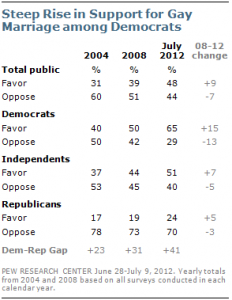The United States was not founded on the principle of political parties. In fact, “Political parties themselves are not necessarily central to democracy” (Coolidge). Furthermore, the Democrat and Republican parties have not been around since the onset of the party system. It started with the Federalists and the Anti-Federalists, the latter of which changed its name to Democratic Republicans who eventually became the Democratic party that we know today. Today’s Republican party has its roots in the combination of The Whigs and abolitionist Democrats, becoming firmly established under Abraham Lincoln (Bush). The two party system that exists today was not established, but rather evolved over time.
For the first time since the establishment of this two party system, leaders, politicians, and the general populace have predicted the end of this system in the near future.
The first indicator of political party breakdown comes within the Republican party. While on a national level Republicans have generally been known to oppose gay marriage, Republican senators and representatives have voiced their opinions supporting equal marriage laws. Furthermore, within the Republican party there has already been a small split, the Tea Party. As do many others, Kent Bush believes that the Tea Party could easily split from its dependence on the Republican Party.
This problem does not just lie with the Republicans, but disputes within the Democratic party have led many to believe that there may be a party split. Democrats nationwide have voiced their complaints about President Obama’s actions, especially in regards to Social Security, Medicare, and taxes. They feel betrayed by some of his proposals, specifically those that are geared to gaining republican support.
Social Security and Medicare are important topics that may form the basis for a strong third party. Social Security is “without a doubt the most popular program ever created in Washington,” along with its “its more recent offspring, Medicare” (Lindorff). It is an issue that could unite Americans from both sides of the political spectrum, and offers a specific focus of the party. The advent of a new party with the capability of gaining strong support from both of the existing parties could be the end of the political system that has been in place for the majority of American history.


